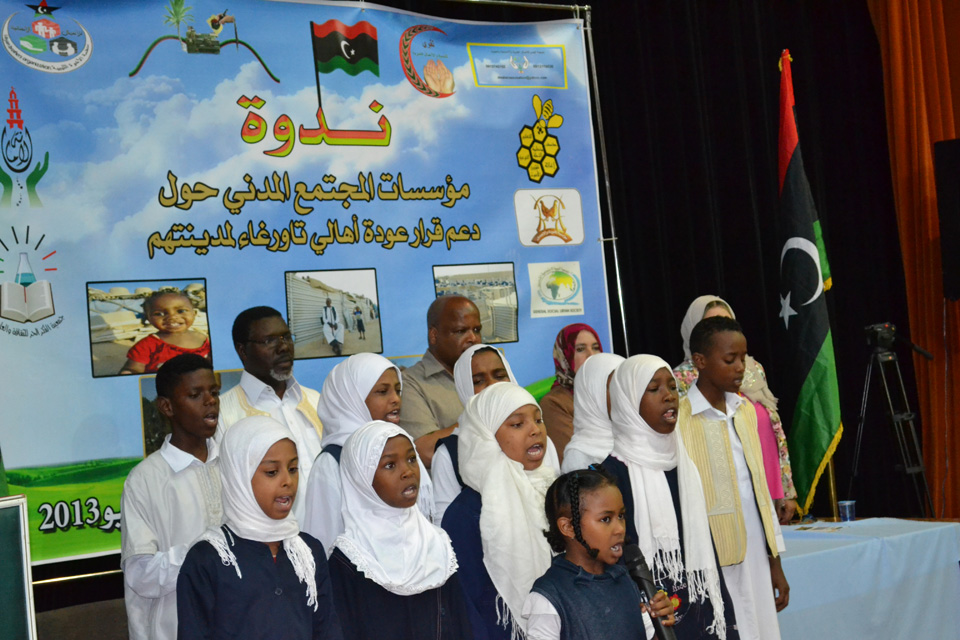By Mathieu Galtier.

Tripoli, 1 June 2013:
About 200 hundred people took part in a conference today intended to draw attention to Tawerghan . . .[restrict]plans to return to their town on 25 June. The decision to return was announced last month by community elders. The Tawerghans want local and international organisations as well as the media to be present on the day, both to cover the event and prevent those opposed to the return, particularly from Misrata, using force to stop them going back.
Today’s event was held by at Janzour Naval Academy, which serves as the biggest Tawerghan camp in Tripoli, with 430 families settled there. Tribal leaders, local human rights groups and academics spoke of the rights of the 42,000 Tawerghans to return home. Tawargha has been a ghost town since August 2011 when revolutionaries from Misrata destroyed the town to punish it for supporting Qaddafi forces during the revolution.
“Families have the right to live in the town of Tawergha,” said Mohamed Muftah Al-Ahmed Al Jafari, a community leader from Jafara district. “We fully support the decision to come back. And the authorities – I mean the General National Congress and the government – have the responsibility to protect these civilians in case of trouble”, he told to the audience to loud applause.
100 politicians invited, 6 appeared
Juma Salem Adem, who managed the conference, focused on the protection of families after the return. The fear is that Misratans may launch a siege of Tawergha as they did last autumn at Bani Walid.
Around a hundred Congress members and representatives from political parties had been invited to the conference. According to the organization, only six came from the two main parties, the Justice and Construction party and the National Forces Alliance. “I was disappointed with the small number of Congress members”, Adem stated. “But we know that Misratan Congressmen put a lot of pressure on their colleagues not to help us,” he alleged.
Two speakers against the return
Among the speakers, two were heckled by the audience when they said that the date of 25 June was too soon. A leader of the Group of Lions of Tripoli which brings together former revolutionaries said that only the authorities could decide the return date of people were to be protected.
A representative from Jebel Nafusa town of Gualish, whose inhabitants supported Qaffafi and were kicked out by Kikla revolutionaries during the conflict, said that Tawerghans and Misratans had to agree on a road map before anything could be achieved.
Hundreds of Tawerghans demonstrated in front of Congress on 19 May to demand it issue a resolution allowing them to return home safely.
The Prime Minister later that day counseled patience. “Tawerghans have a right to go back to their homes but the environment is difficult right now.”
Human rights organisations support Tawerghans’ decision
Human rights organisations have already supported the Tawerghans’ return. Human Rights Watch described the treatment of people from Tawergha as a “crime against humanity”. Lawyers for Justice in Libya welcomed “Tawerghan decision to return home” on Thursday.
However, officials of Misrata are firmly opposed. “Nobody in Misrata wants them to go back. What would you feel if someone who had killed your father lived around your place? Nobody can change history – and history is clear [on who are the criminals],” Khalifa Zway, a member of Misrata Local Council said recently. He stated that Misratans were ready to pay to build accommodation for Tawerghans in Tripoli or Benghazi.
Juma Salem Adem told the Libya Herald he agreed to hand over to justice Tawerghans suspected of crimes during the revolution on two conditions. “We want to see real evidences of the crimes and we would send our people to justice in Tripoli, not Misrata.” According to the International Crisis Group, more than 1,000 Tawerghans are being held illegally in jail in Misrata. [/restrict]







